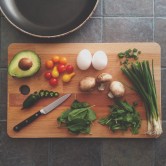Healthy Heart: 5 Cholesterol Myths Busted!

Before we jump into some myths, let's make sure we're on the same page when it comes to what exactly cholesterol is.
MedlinePlus.gov describes it like this: "Cholesterol is a waxy, fat-like substance that's found in all the cells in your body. Your body needs some cholesterol to make hormones, vitamin D, and substances that help you digest foods. Your body makes all the cholesterol it needs. Cholesterol is also found in foods from animal sources, such as egg yolks, meat, and cheese."
The problem is when there's too much cholesterol in your blood. It can combine with other substances in your blood to build plaque which then sticks to the walls of your arteries, slowly blocking them till they don't work properly any more. That's bad news for your heart.
And that brings us to our first busted myth...
Myth #1: “Cholesterol” is Cholesterol
While cholesterol is an actual molecule, what it is bound to while it's floating through your blood is what's more important than just how much of it there is overall. In fact, depending on what it's combined with can have opposite effects on your arteries and heart. Yes, opposite!So cholesterol is just one component of a compound that floats around your blood. These compounds contain cholesterol as well as fats and special proteins called “lipoproteins."
They're grouped into two main categories:
HDL: High Density Lipoprotein (AKA “good” cholesterol) that “cleans up” some of those infamous “arterial plaques” and transports cholesterol back to the liver.
LDL: Low Density Lipoprotein (AKA “bad” cholesterol) that transports cholesterol from the liver (and is the kind found to accumulate in arteries and become easily oxidized hence their “badness”).
And yes, it's even more complicated than this. Each of these categories is further broken down into subcategories which can also be measured in a blood test.
So “cholesterol” isn't simply cholesterol. It has very different effects on your body depending on which other molecules it's bound to in your blood and what it's actually doing there.
See: 3 Reasons Why Being Overweight is Bad For Your Health
Myth #2: Cholesterol Is Bad
Cholesterol is absolutely necessary for your body to produce critical things like vitamin D when your skin is exposed to the sun, your sex hormones (e.g. estrogen and testosterone), as well as bile to help you absorb dietary fats. Not to mention that it's incorporated into the membranes of your cells.Talk about an important molecule!
The overall amount of cholesterol in your blood (AKA “total cholesterol”) isn't nearly as important as how much of each kind you have in your blood.
While way too much LDL cholesterol as compared with HDL (the LDL:HDL ratio) may be associated with an increased risk of heart disease, it is absolutely not the only thing to consider for heart health.
Myth #3: Eating Cholesterol Increases Your Bad Cholesterol
Most of the cholesterol in your blood is made by your liver. It's actually not from the cholesterol you eat. Why do you think cholesterol medications block an enzyme in your liver (HMG Co-A reductase, to be exact)? 'Cause that's where it's made!What you eat still can affect how much cholesterol your liver produces. After a cholesterol-rich meal your liver doesn't need to make as much.
That's why eating eggs isn't a "bad" thing any longer.
Myth #4: Your Cholesterol Should Be As Low As Possible
As with almost everything in health and wellness there's a balance that needs to be maintained. There are very few extremes that are going to serve you well.People with too-low levels of cholesterol have increased risk of death from other non-heart-related issues like certain types of cancers, as well as suicide.
Myth #5: Drugs Are The Only Way To Get A Good Cholesterol Balance
Obviously, if you're currently taking any medications, don't start or stop any medications without talking with your doctor first.And while drugs can certainly lower the “bad” LDL cholesterol they don't seem to be able to raise the “good” HDL cholesterol all that well.
Guess what does?
Nutrition and exercise, baby!
One of the most impactful ways to lower your cholesterol with diet is to eat lots of fruits and veggies. Lots. Like, 10 servings a day. Every day. The fiber in these foods can help lower your cholesterol.
See: Top 5 Healthy Dark Green Vegetables
Legumes, like beans, nuts, peas, lentils, are another great source of fiber. Eat at least 1/2 cup to a 1 cup a day of legumes -- except for the nuts. They’re higher in calories, so aim for 1/3 of a cup of nuts and/or seeds.
See: 3 Smart Reasons Why You Need Fiber In Your Diet
Eating fish rich in omega-3 fatty acids can help keep your heart healthy. Eat fish like salmon, tuna or halibut at least twice a week.
The recipe below should help you add at least another salad to your day!
You can (should?) also exercise, lose weight, stop smoking, and eat better quality fats to help lower your cholesterol. That means the fatty fish mentioned above, avocados and olive oil. Ditch those over-processed hydrogenated “trans” fats.
In a nutshell:
The science of cholesterol and heart health is complicated and we're learning more every day. You may not need to be as afraid of it as you are. And there is a lot you can do from a nutrition and lifestyle perspective to improve your cholesterol level.
Recipe (Dressing to go with your salad): Orange Hemp Seed Dressing
Makes about ¾ cup- ½ cup hemp seeds
- ½ cup orange juice
- 1 clove of garlic, peeled
- dash salt and/or pepper
Blend all ingredients together until creamy.
Serve on top of your favourite salad and Enjoy!
Tip: Store extra in airtight container in the fridge. Will keep for about a week.
Must Read
How Do I Lose Weight?
6 Small Steps to Successful Weight Loss (with worksheets!)
